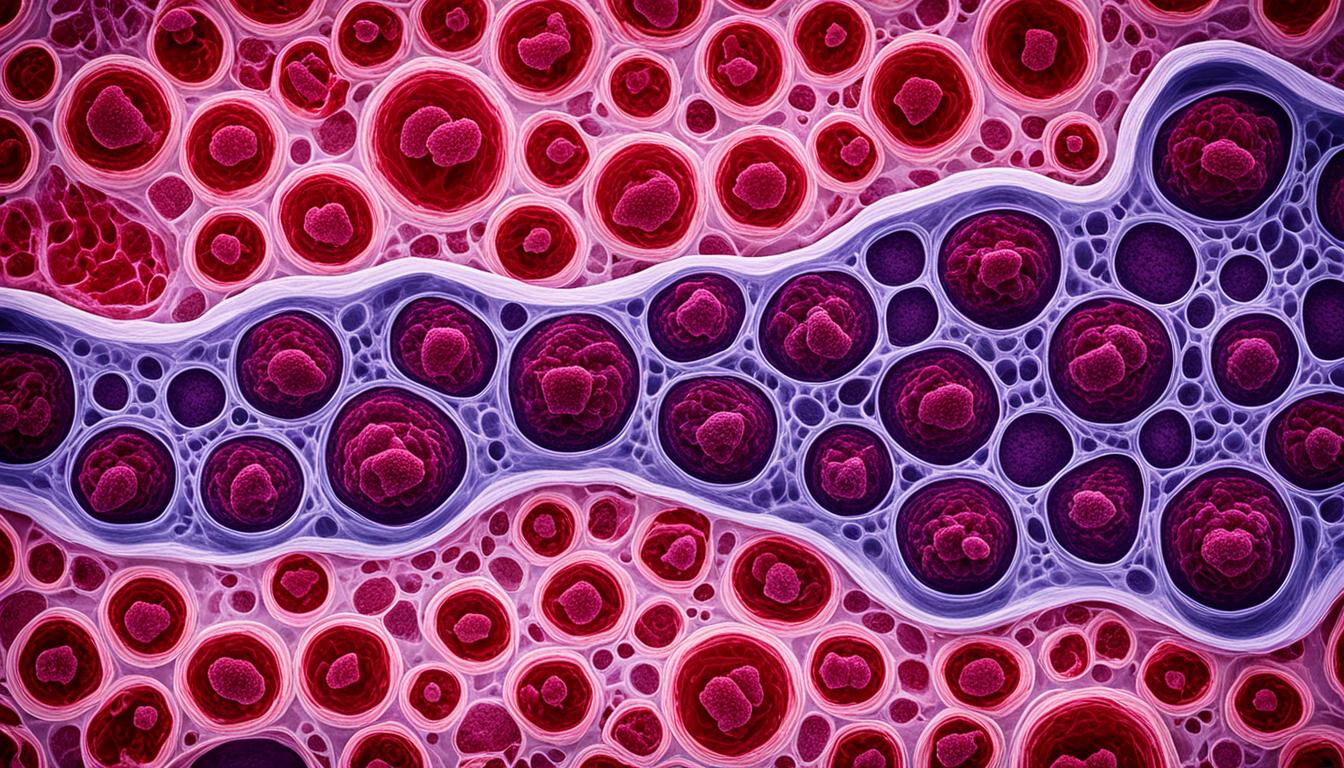In the 21st century, cancer has become the leading cause of death in developed countries. It devastates individuals and families alike. Understanding the causes and new treatments is now critical. Recent studies show the role of stem cells in stomach cancer’s development.
Tumor-initiating stem cells are well known within the stomach and intestines. They account for the variety of tumors and their quick spread. Discovering these stem cells has led to a better understanding of gastric cancer’s biology.
The Wnt pathway, vital for intestinal self-renewal, also influences stomach tissue. Stem cells in the stomach linings continually reproduce it. These stem cells create more cells that eventually turn into different, needed cell types.
The stomach also has stem cells that keep the tissue healthy and fix it when needed. By studying these normal stem cells closely, researchers learn about how gastric cancer forms and how to treat it.
Stem cell therapy looks hopeful for treating stomach cancer in the future. It suggests a way to target and get rid of cancer stem cells, which promote tumor growth and resist common treatment. We need more studies to understand how well and how stem cell therapy works against stomach cancer. But it does bring hope for a better prognosis and life quality for patients.
Key Takeaways:
- Stomach cancer has become a leading cause of death, highlighting the need for better understanding and treatment options.
- Stem cells play a crucial role in the development and progression of gastric cancer.
- Stem cells in the stomach and intestine offer insights into tumor heterogeneity and functional epithelial cell differentiation.
- Stem cell therapy holds promise for targeted treatment and better outcomes for stomach cancer patients.
- Further research is needed to fully explore the potential of stem cell therapy in stomach cancer treatment.
Stomach Cancer Symptoms and Causes
Stomach cancer, or gastric cancer, is a severe illness of the stomach lining. If not found and treated early, it can have severe outcomes. It often shows no symptoms at the start. Yet, spotting symptoms early is vital. This can lead to early detection and treatment. Knowing the causes and risks helps people lower their chances. They can also get medical help early.
Stomach Cancer Symptoms
In its early stages, stomach cancer doesn’t often have noticeable signs. This makes it hard to find. But, as it grows, some symptoms may show up. This highlights the need for a closer look. Signs of stomach cancer may include:
- Abdominal pain
- Persistent indigestion
- Unintentional weight loss
- Difficulty swallowing
- Nausea and vomiting
If you have any of these signs, it’s crucial to see a doctor for check-up.
Stomach Cancer Causes and Risk Factors
The exact cause of stomach cancer is unclear. Although, there are known risk factors. These include:
- Infection with Helicobacter pylori bacteria
- A family history of gastric cancer
- Smoking
- Heavy alcohol consumption
- Certain genetic mutations
- A diet high in salted or smoked foods
It’s key to remember, having these factors doesn’t mean you’ll get stomach cancer. And, some get it without any known risks. Checking with a doctor regularly is critical. This helps watch for any troubling signs.
Sometimes, the cancer spreads to other areas. This is called metastatic stomach cancer. It needs special treatment and care.
Finding stomach cancer early can greatly improve someone’s care. Regular check-ups and quick attention to any symptoms are very important.
Stem Cell Therapy for Stomach Cancer
Stem cell therapy is a new way to treat diseases like stomach cancer. It targets the disease directly, showing promise in improving patient outcomes.
Stem cells can home in on and eliminate the root of cancer, the cancer stem cells. This focused approach might help overcome treatment resistance, improving how long patients survive.
But, we’re still learning about how effective stem cell therapy can be for stomach cancer. More studies are needed to fully grasp its impact and workings. Scientists are working hard to make these treatments better and spot-on.
Overall, stem cell therapy is a ray of hope for fighting stomach cancer. It could lead to better outcomes and life quality for those battling the disease. It shines as a way forward in battling this serious illness.
FAQ
Q: What are the symptoms of stomach cancer?
A: Stomach cancer can show up in various ways. You might have a lot of stomach pain or ongoing indigestion. Some people lose weight without trying, and others find it hard to swallow. Nausea and vomiting could also be signs.
Q: What are the causes of stomach cancer?
A: Doctors are still learning about what causes stomach cancer. But, things like a certain stomach bacteria or a family history can make it more likely. Smoking, drinking a lot of alcohol, and even your diet could also play a role. This includes eating a lot of salted or smoked foods.
Q: Can stomach cancer spread to other parts of the body?
A: Stomach cancer is serious because it can move to places like the liver, lungs, or bones. When it spreads, doctors call it metastasized stomach cancer.
Q: Why is early detection of stomach cancer important?
A: Finding stomach cancer early can really help. It makes treatments more likely to work, and gives patients a better chance to recover.
Q: What is stem cell therapy for stomach cancer?
A: Stem cell therapy is a new way to treat stomach cancer. It works by going after the cancer’s core. This can help stop cancer’s growth.
Q: How does stem cell therapy improve outcomes for stomach cancer patients?
A: Stem cell therapy targets what starts the cancer. By focusing on these cancer stem cells, it might make treatments better. This could mean a longer life for stomach cancer patients.
Q: What is the potential of stem cell therapy for stomach cancer treatment?
A: For treating stomach cancer, stem cell therapy looks very promising. It brings a lot of hope for better healing chances and life quality for these patients.

